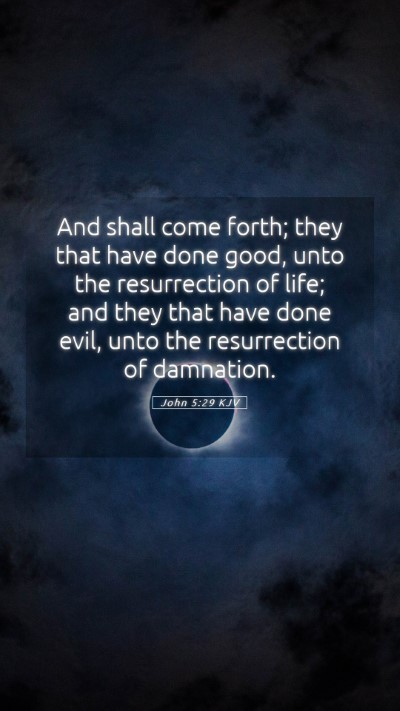Understanding John 5:29 - A Comprehensive Bible Verse Commentary
John 5:29 states, “And shall come forth; they that have done good, unto the resurrection of life; and they that have done evil, unto the resurrection of damnation.” This verse speaks profoundly about the resurrection: a fundamental belief in Christian eschatology regarding the afterlife and the consequences of one's earthly actions. Below is a detailed exploration of the meaning, interpretations, and significance of this scripture, drawing insights from classic public domain commentaries by Matthew Henry, Albert Barnes, and Adam Clarke.
Verse Overview
In this verse, Jesus articulates the distinctions in the resurrected state based on moral behavior during one's life. The core implications revolve around resurrection, judgment, and eternal destinies.
Key Themes in John 5:29
- Resurrection: The promise of resurrection is central. It signifies that all will be raised from the dead, a theme echoed throughout the New Testament.
- Judgment: The verse indicates a bifurcated judgment: rewards for good deeds versus condemnation for evil acts.
- Moral Accountability: It emphasizes the importance of moral choices and their impact on one's eternal fate.
Bible Verse Meanings and Interpretations
Various commentaries offer insights that enhance our understanding of this verse:
Matthew Henry's Commentary
Henry emphasizes the certainty of resurrection and judgment, highlighting the distinctions between the righteous and the wicked. He asserts that “doing good” refers to a life aligned with God’s will, resulting in a resurrection that leads to eternal life. Conversely, “doing evil” reflects a life devoid of God’s guidance, leading to condemnation.
Albert Barnes' Insight
Barnes discusses the nature of the resurrection and the criteria for judgment. He reflects on the resurrection of life being a reward for faith and obedience, while resurrection unto damnation serves as a warning against willful disobedience to God’s commands. Furthermore, he links this passage to the larger theme of salvation through faith in Jesus Christ.
Adam Clarke's Exegesis
Clarke explores the Greek terms used in this verse, noting that they point to a literal resurrection. He emphasizes the significance of “done good” as encompassing the entirety of one’s life choices, advocating for a holistic understanding that includes faith manifesting in good works. Clarke underscores the notion that resurrection is not merely an event but a comprehensive experience that reflects one's earthly life choices.
Historical Context and Application
Understanding the historical and cultural context is crucial for interpreting John 5:29. During the time of Jesus, the Jewish belief in resurrection was emerging, juxtaposed against Sadducean denial of life after death. Jesus affirmed and expanded upon these beliefs by teaching that all would ultimately confront their Creator.
Practical Implications for Daily Life
When applying John 5:29 to everyday life, believers are encouraged to live purposefully, recognizing the eternal significance of their actions. This verse calls for:
- Self-Reflection: Regularly evaluating one's life in light of scriptural teachings.
- Ethical Living: Choosing paths that prioritize goodness and kindness towards others.
- Spiritual Growth: Seeking to deepen one’s faith and understanding of God’s will through study and prayer.
Related Bible Cross References
- John 11:25-26 - Jesus as the resurrection and the life.
- Romans 2:6-8 - God will repay each person according to their deeds.
- Revelation 20:12 - The dead being judged according to what they had done as recorded in the books.
Final Thoughts
In conclusion, John 5:29 is a rich tapestry of promise, warning, and encouragement. It serves as a powerful reminder of the consequences of our actions and the hope we have in Christ for eternal life. Engaging with this scripture deeply through study and reflection aids believers in understanding their faith and the moral imperatives that come with it.


